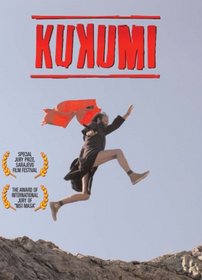| Actors: Luan Jaha, Anisa Ismaili, Donat Qosja Director: Isa Qosja Genres: Action & Adventure, Indie & Art House, Drama Sub-Genres: Action & Adventure, Indie & Art House, Drama Studio: Cinequest Format: DVD - Color DVD Release Date: 12/05/2006 Release Year: 2006 Run Time: 1hr 47min Screens: Color Number of Discs: 1 SwapaDVD Credits: 1 Total Copies: 0 Members Wishing: 1 MPAA Rating: PG-13 (Parental Guidance Suggested) Languages: English |
Search - Kukumi on DVD
  | Kukumi Actors: Luan Jaha, Anisa Ismaili, Donat Qosja Director: Isa Qosja Genres: Action & Adventure, Indie & Art House, Drama PG-13 2006 1hr 47min Regione del Veneto Award - Venice Film Festival — Jury Prize - Sarajevo Film Festival With "a poetic, intense opening that recalls ... Tarkovsky," it is the story of Kukumi, Mara and Hasan, three patients "liberated" fro... more » |
Larger Image |
Movie DetailsSimilar Movies
|
Movie ReviewsIn wartime, where is the REAL insanity...? Larry L. Looney | Austin, Texas USA | 12/28/2006 (5 out of 5 stars) "This film, by Kosovo `painter-director' Isa Qosja, is the first film to emerge from that country since the war in 1999 that left the region devastated and reeling. Co-written by Qosja with Mehmet Kraja, KUKUMI follows three unlikely protagonists - Kukumi, Mara and Hassan, inmates of a mental hospital - through the tattered physical and emotional landscape that remains as the fighting comes to a halt. When news of the signing of the UN accord comes over the radio, the soldiers who have been guarding the hospital can't abandon their posts quickly enough - they hop into jeeps and whatever other means of conveyance they can commandeer and leave nothing but their settling dust behind, along with open gates and a bewildered group of patients left to fend for themselves.
Kukumi narrates the film, and explains that as a newborn he cried constantly for several days, driving his parents and neighbors mad, until a local woman arrived to cast a spell to stop his wailing. He remarks that he hasn't cried since - an observation that is all the more poignant in light of the heartbreaking scenes he encounters outside the gates. Along with Mara and Hassan, he sets out into the world and tries to make sense of what has suddenly been opened to him. It's a difficult task for anyone to make sense of war - perhaps being insane is an advantage. It's hard to say. The three travelers view their world with a childlike wonder - there are things they have never seen before, things which they have understandable difficulty in understanding. From the outset, there is a conflict between Kukumi and Hassan - they are both attracted to Mara, and both express a desire to marry her - but rather than come to blows in a situation that could easily lead to such actions among `normal' citizens, they take a more philosophical approach. Whether it's because they're merely parroting feelings that are expected to occur between men and women, or whether their feelings for Mara are underdeveloped for other reasons, they never come close to violence over her - they're more likely to get physical in defending her from outsiders than with each other. They make their way to Hassan's home village, nearby, to find that his family is less than welcoming - his sister-in-law berates his brother for even thinking about having anything to do with him, considering him to be an embarrassment to their family and a serious liability if he hangs around. Hassan's honest delight and enthusiasm in locating his brother again is heart-wrenching compared with the reception he gets. The cinematography and direction is stunning - from the long opening shot that begins with a view of a man sleeping on a cot in a room in the hospital, then retreats through the window to show other inmates milling around in the rain outside the building, it's apparent that we're in for something very special here. The camera pans around and finds Kukumi standing in the exercise yard in the downpour. Other patients approach him, gesturing or speaking words we can't quite hear - but only when a young woman we soon learn to be Mara entreats him with an open, waiflike smile, does he relent and pull his flute from a fold in his robe and begin to play. The melody is beautiful and haunting - it sets the mood for Kukumi's outlook on the world, and for the remainder of the film. I've read reviews in a few places that seem to think that the metaphoric aspect of Qosja's film is too obvious, and that this somehow lessens the impact of this work - but I disagree. While the metaphor of the three being children of war, extended to embrace everyone who has been touched by the madness of such conflict, is definitely an element, I believe the film can be viewed more directly as a simple story of pain, loss and discovery - and it's a good look at the shameful way that the mentally ill are viewed and treated by the world as a whole. Qosja's direction is never heavy-handed - he lets the story and the characters carry the film beautifully. I don't know if the actors in KUKUMI are professionals or not - but they give strikingly honest, believable performances, never condescending toward their characters in the least bit. There is sadness and pain here - but there is also joy, and a good dose of humor added from time to time (especially in the scene where Kukumi comes across an outdoor ceremony honoring some visiting engineers from Thailand who have come to Kosovo to aid in reconstruction). Whether you're simply in the mood for something different, or you're just looking for a well-made, moving film, you should check out KUKUMI. It's another release from the good folks at CineQuest - it's a film you won't soon forget. " |




![The Lives of Others [Blu-ray]](https://nationalbookswap.com/dvd/s/98/7098/167098.jpg)

